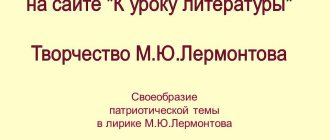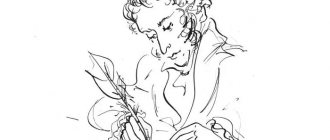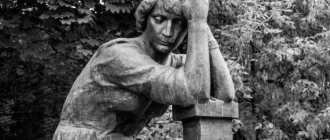Anna Akhmatova did not like being called a poetess. She heard something disdainful in this word. Her poetry, on the one hand, was very feminine, intimate and sensual, but, on the other hand, it also contained quite masculine themes, such as creativity, the historical upheavals of Russia, and war. Akhmatova was a representative of one of the modernist movements - Acmeism. Members of the “Workshop of Poets” group, an organization of Acmeists, believed that creativity is a kind of craft, and the poet is a master who must use the word as a building material.
Akhmatova as an Acmeist poet
Akemism is one of the movements of modernism. Representatives of this trend came into conflict with the Symbolists and their mysticism. For Acmeists, poetry is a craft that can be learned if you constantly practice and improve. Akhmatova was of the same opinion. Acmeists have few images and symbols in their poems; words are selected carefully, so it is not at all necessary to use them in a figurative sense. One of the most famous poems that Akhmatova wrote is “Courage.” Analysis of the poem shows how significant the Russian language was for the poetess. Ator treats him very reverently and respectfully: this is manifested both at the level of form and at the level of content. There are practically no means of expression in the poem; the phrases are short and succinct.
Analysis 2
This poem was written in 1836. The poetess was not at all hindered by military operations at this time.
The poem “Creativity” describes the very process of writing a work. Readers will definitely get confused while reading this verse. And that's okay. With this, the author wanted to show the chaos of thoughts in her head. And the elements of chaos and confusion itself are manifested in the constant sound of a clock ticking, thunder, groans... But gradually the whole circle of thoughts narrows. As a result of this we get a foundation. This is the hair from which the main idea begins to curl. Now you can fantasize within reason. Akhmatova even used sounds that disturbed her in the poem.
Next, the poetess will be helped by her skill and knowledge. She finds words that fit not only the rhyme, but also the meaning. These two components are the most important in the process of creating any poem. But there are varieties of poetry. Some of them don't require rhyme. There are also poems that do not require a connection with meaning.
“Creativity” has some outlines of symbolism. And this is not explained in clear terms. We cannot know for sure what the poetess is thinking about at one time or another. Notes of romanticism are also present here. After all, the atmosphere itself is fantastic, unbridled, unknown like space.
Analysis of the poem Creativity according to plan
Theme and idea of the poem
The main theme of the poem is the Great Patriotic War. Akhmatova implements this theme in her own way. The main thing that people need, Akhmatova believes, is courage. An analysis of the verse shows how in just a few lines the poetess was able to express the idea that enemies are claiming to destroy Russian culture and to enslave the Russian people. She does this by naming the most important thing for a Russian person - the Russian language, original and unique.
Analysis of the poem “Creativity” by Akhmatova
Anna Andreevna Akhmatova is one of the most prominent personalities of the Silver Age. Akhmatova is a poet who is spoken of as the successor of Alexander Sergeevich Pushkin. He, as you know, believed that the path of a poet should be filled with torment and doubts about the purpose of a poet. Poetry should bring people the ideals of love, friendship, kindness, mercy, honor and dignity. And the role of the poet is to discover in a person the brightness that is in him.
Anna Andreevna's life is reflected in her work. The poetess understands that through her poems she is able to influence people, their feelings and emotions.
The poem “Creativity” was written in 1936. This work subtly describes the mysterious process of creating poetry. The poem is part of the “Secrets of the Craft” cycle. In this series of poems, the poetess talks about creativity. She believes that the process of writing is a magical rite of discovery of one's imagination. “I feel like there are complaints and groans, some kind of secret circle is narrowing,” writes Akhmatova. At moments of creativity, the poet seems to be in some kind of disorder, which ultimately becomes a finished work. One gets the impression that a whirlwind of events and impressions literally captures the author in order to transport him to a state of inspiration. The poetess draws a line between the real world and the world of the poet, in which he creates his poems.
But in this abyss of whispers and ringings, one, all-conquering sound arises.
The poem was subject to numerous criticism from Akhmatova’s circle. People were distrustful of the meaning of this poem and did not understand its essence. This happened because the poetess described the concept of creativity as a kind of mystical process that occurs only with the intervention of higher powers.
Source
Meter, rhyme, rhetoric and stanza
An analysis of the poem “Courage” by Akhmatova must begin with a consideration of its construction. It is written in amphibrachic pentameter. This size gives the verse recitativeness and clarity; it sounds abrupt, inviting, and rhythmic. The poem has three stanzas. Two of them are full-fledged quatrains, that is, they consist of four lines connected by cross rhyme. The third stanza ends unexpectedly on the third line, which consists of only one word - “forever.” Akhmatova thereby emphasizes the significance of this word, her steadfastness and confidence in the power of the Russian people and the country as a whole. With this word she sets the general mood of the text: Russian culture will exist forever, no one can destroy it. Of course, neither the language nor the culture of a country can survive without the people, who must show courage and simply cannot give up.
Intimate lyrics by A.A. Akhmatova
In intimate lyrics, Anna Andreevna does not limit herself to describing lovers and their relationships. She is more interested in the inner world of lovers, to which she devotes a special place. Her work is unique, her poems are distinguished by their originality and sensuality. In her poems, Anna Andreevna reveals the innermost feelings of her lyrical heroine. As for the heroine’s thoughts, they are very deep and philosophical.
Anna Akhmatova reveals all the most intimate things that every person has. Perhaps, thanks to its sincerity, sensuality and uniqueness, the work of Anna Andreevna Akhmatova is still very popular. She doesn't pretend, she doesn't try to seem better. No, she shows all things as they really are.
Throughout her creative life, Anna Andreevna carried a spiritual connection with her homeland. She is ready to make any sacrifice for her sake, giving up her own happiness and closeness with her family. This can be seen in the work “Prayer”, the events of which, unfortunately, were fulfilled in the life of the poetess.
“Courage”, Akhmatova: analysis of means of expression
In any plan for analyzing poetry, there is always a point “means of expression.” Moreover, it is not enough to simply write them out; you also need to determine the function of each of the means in the text. As noted above, the Acmeists used few figurative means in their poems, and Akhmatova adhered to the same principle.” Courage,” the analysis of which necessarily requires consideration of lexical and syntactic figures of speech, is of great interest. The poem begins with an extended metaphor. “Our Watches” is a gloomy modernity. Akhmatova fell on hard times: the First World War, revolution, civil war... And now the Second World War... Akhmatova did not leave the country when the first wave of emigration subsided, and she did not leave it during the years of Hitler’s invasion. Akhmatova personifies Russian speech and the Russian word, addressing him as a friend, using “you”. In connection with this personification, a metaphor arises - we will save you from captivity. This metaphor means that if Hitler’s Germany had won over Russia, the Russian language would have faded into the background, children would not have been taught it, and it would have stopped developing. And the decline of the Russian language means the complete decline of Russian culture and the destruction of centuries-old traditions and the nation as a whole.
The poem uses lexical repetition; the author draws attention to certain meanings: hour-hours, courage-courage (in the first stanza). The poetess also used syntactic parallelism in the second stanza, which enhances the effect of the expressed idea that the Russian people will fight desperately, to the last drop of blood, not sparing themselves, showing courage. Akhmatova (analysis has proven this) does not betray the canons of Acmeism, but speaks about a topical problem.
Means of expression
To convey the inner state of lovers, A. Akhmatova uses linguistic means. They are also a tool for realizing an idea. The text contains metaphors - “my chest grew cold helplessly,” “the autumn whisper asked between the maples,” “I was deceived by my sad, changeable, evil fate”; epithets - “easy steps”, “changeable fate”, “last meeting”, “indifferent yellow fire”. The author does not use comparisons.
Previous
Analysis of the poems “To the Sea” analysis of Pushkin’s poem according to the plan briefly - poetic size, genre, to whom it is dedicated
Next
Analysis of the poem “She was sitting on the floor” analysis of Tyutchev’s poem according to the plan briefly - to whom it is dedicated, means of expression, genre
Brief Analysis
History of writing - The verse was written in 1961, and refers to the final period of the poetess’s work.
The theme of the poem is Love for the Motherland.
Composition – Compositionally, the poem is divided into two parts. In the first part, the lyrical heroine denies any external manifestation of love for her homeland, and in the second she shares her definition of the homeland.
Genre – Patriotic lyrics.
Poetic meter - The first 8 lines are written in iambic, the next 6 lines are written in anapest, using cross and pair rhymes.
Metaphors – “dirt on galoshes”, “crunch on teeth”.
Epithets – “cherished”, “bitter”, “promised”.
Inversion - “we do not do it in our souls.”
History of creation
Akhmatova wrote “Native Land” in 1961. The poetess was already old and was undergoing treatment in the hospital. The late period of Anna Andreevna’s work was distinguished by a large number of thoughts, memories and summing up the results of her life. The poem was published in the collection “A Wreath for the Dead.”
One cannot help but recall the poetess’s loyalty to her homeland. After all, she remained in Russia, even when life created unbearable conditions. After the revolution of 1917 took place in the state, Anna Akhmatova had many opportunities to leave the country where mass unrest was taking place.
Many of the writer’s relatives and friends lived permanently in Europe. However, Anna Andreevna refused each of their invitations; it was hard for her to leave the places dear to her heart . The poetess could not imagine life among strangers, far from her homeland. After the coup d'etat, during the most important period in the history of Russia, she again decided, no matter what, to share the fate of her country.
But the decision cost the woman a lot of shed tears. Akhmatova shared the fate of millions of citizens. She had to see the arrests of loved ones, many of whom were shot or died in the camps without waiting for their release. The authorities also shot Anna Andreevna’s husband, and the woman’s only son, Lev Gumilyov, did not escape arrest. He spent 10 years in prison. The threat of repression and exile also constantly hung over the poetess herself. Akhmatova also survived all the horrors of besieged Leningrad.
In 1961, Akhmatova wrote a poem. She viewed her homeland not just as a country, but as a land that nurtured and raised many generations; she was like the mother of an entire people. However, its value began to be forgotten by contemporaries.
Genre, direction, size
The genre of “Prayers” is the traditional prayer poem for Akhmatova: small volume, expressiveness and eloquence, solemnity of style.
Speaking about the direction in which Anna Andreevna worked, it is worth mentioning Acmeism. The Acmeists abandoned the principles of symbolism and introduced their own canons - clarity in expressing the author's position and a return to the material world.
The short poem is written in cross rhyme (ABAB) and has an anapest meter.





